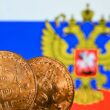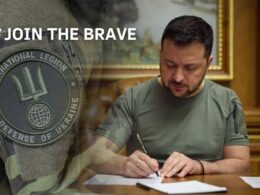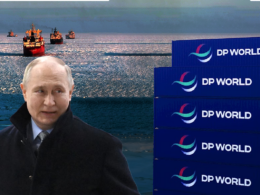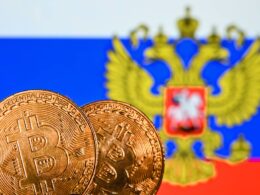Now the world’s attention is focused on the war that Russia has waged against Ukraine. One by one, the world leaders start calling this war completely ill-founded, talk about the global aftermath, and try to predict the development of the situation. However, there is one important area that falls out of the general discourse. Namely, the transformation of history into one of the auxiliary fronts of Russia’s attack. The algorithm of Russia’s actions on the historical front is quite simple – the necessary facts are amplified, while events that contradict the Russian narrative are mostly silenced or ignored.

Indeed, Russia has long been distorting historical events to justify its aggressive appetites. One of the main myths of Russian state ideology is the cult of the Great Patriotic War. For Russia’s domestic audience, this cult helps to strengthen the militarization of society, to mobilise citizens to support any military action against other states. No wonder, one of the “official” reasons for launching a “special operation” against Ukraine is de-Nazifying, the fight against imaginary Nazis who allegedly control the country. For Russians, this should create the illusion of a “holy” war against Ukraine, which is supposed to be a continuation of the sacred fight against fascism during World War II, in fact equating it to the Crusades against Absolute Evil.
However, there is an external vector of this narrative, which is addressed primarily to the West. Long before the Russian aggression against Ukraine during the Victory Day celebrations, one could see the slogans “We can repeat this”. These slogans were in fact a threat to Europe and were contrasting with the generally accepted international slogan “Never again”, which is used in Ukraine as well. And now you can see the inscriptions “Towards Berlin” on some combat helicopters of the Armed Forces of the Russian Federation attacking Ukraine. This is not only an attempt to equate Ukrainians with the German Nazis of the Third Reich, but also a clear signal that the Kremlin is not going to stop in Ukraine and intends to move forward in Europe.

At the same time, Russia is quite successfully exploiting Western society, or rather a certain feeling of guilt about the Soviet Union for the war crimes committed by the Third Reich on Soviet lands. To do this, Russia is successfully shaping the image of a country that has suffered exclusively on its own and was able to win without outside help. To people who are not into history this may seem plausible, and it influences the economic, political and security decisions of some Western politicians.
This myth is quite easy to dispel if one just looks at the map of World War II. Thus, the main attack of then German army on the USSR happened on the lands of modern Belarus and Ukraine. So their territories were under siege and waves of battles swept over them several times. In particular, in 1941-1943 – the attack of German troops with the subsequent siege of territories and the counterattack of the Soviet army in 1943-45. About 1.5 million people were illegally deported from Ukraine for forced labour in Germany, and the situation was similar in Belarus. At the same time, during the siege everywhere the German military committed mass tortures or executions of local residents as a punishment for guerrilla warfare.
In total, the losses of Ukraine (as the second largest republic in the USSR) in World War II are estimated at 8 million people. The total number of Ukrainians who fought in the Soviet Army is estimated at 4.5-7 million people: 2.5 million people died as a part of the Red Army and the remaining 5.5 million – casualties among civilians. So the losses of Ukraine made about 30% of the 27 million total losses of the USSR. According to the study “Germany and the Second World War” the losses of Germany made 6.3 million people, thus the losses of Ukraine are almost one and a half times greater than the total loss of Germany. Belarus had about 620,000 military casualties and about 1.7 million civilian casualties. These figures are too high to ignore. In turn, Russian territory suffered much less from the siege – a smaller part of the territory was occupied, mostly only the European part not further than Ural. At the same time, depending on the political agenda, the current Russian government is deliberately concealing the contribution of Ukrainians or, for example, Georgians and other nationalities to the overall victory in the Second World War, the number of victims or their share in the total is significantly reduced.
This has created a misconception in the West that only the Russian Federation, as the successor to the USSR, has the right to some sympathy and, consequently, to certain political and economic preferences.
After the Second World War, Germany focused on the policy of reconciliation with the Soviet Union, especially with Moscow. Prior to the current full-scale phase of the Russian-Ukrainian war (it should be recalled that this war has been going on since 2014), one could often hear the thesis of “special relations” between Russia and Germany. German politicians have traditionally been sympathetic to Russia’s actions in Crimea and Donbas, while implementing Russia’s Nord Stream-2 gas pipeline project, speaking of its purely economic nature, ignoring Ukraine’s claims. Of course, part of the responsibility for this lies with Ukraine itself, as its diplomatic and political efforts to convey its views to the West cannot be called perfect.
Also for the sake of objectivity, it should be noted that since the beginning of the Russian aggression in 2014, Germany has provided great assistance to Ukraine in the military health care field. Most of these efforts were focused on health care – more than 160 Ukrainian soldiers were admitted for treatment in Germany. In 2019, the federal government purchased state-of-the-art medical equipment (mobile X-ray machines, digital surgical machines and angiograms) for Ukraine worth € 1.5 million. In 2020 they doubled funding to € 3 million and in 2021 gave € 3.1 million to purchase the latest equipment for health care facilities of the Ministry of Defense of Ukraine. In total, since 2014, Germany has provided us with over € 13 million for medical supplies and equipment. However, there was not a word of transferring defence weapons. Despite repeated appeals from the Ukrainian authorities, the German authorities refused to provide serious military support to Kyiv.
Even when in 2021 Russia for the first time massively concentrated its troops near the Ukrainian border and Kyiv officially sent a list of necessary military equipment and weapons, including air defence and anti-ship missiles. Later, in April 2021, Norbert Röttgen (then a member of the CDU praesidium and chairman of the Bundestag’s foreign affairs committee) supported the request. However, in a few days, his statements caused a real scandal among German politicians and citizens, who continued to wear the “pink glasses” of pacifism. It was announced that weapons could not be supplied to Kyiv.

Moreover, in early 2021, Ukraine, through the NATO Support and Procurement Organisation (NSPA), purchased 90 large-calibre Barrett M82 sniper rifles in the United States and 20 Electronic Drone Mitigation System EDM4S-UA in Lithuania, but failed to obtain them in time due to Germany blocking the execution of agreements. Just days before the end of her term in December 2021, then-German Chancellor Angela Merkel partially renounced her veto. In addition, Germany has blocked cooperation with a number of Ukrainian defence companies in the joint development of weapons and transfer of technology. And this despite the fact that Germany is one of the largest arms exporters in the world after the United States, Russia, France and China.

Will there be a renunciation of these “special relations” with Russia now? According to the statements of the current Chancellor of Germany Olaf Scholz – yes, there will be. It is possible that the current senseless war that Putin has waged against Ukraine will help all Germans open their eyes and look soberly at Russia, without the Kremlin’s narratives. However, only real actions can confirm the authenticity of these intentions. Ukraine still needs weapons to defend itself against Kremlin’s attacks. And it is entirely in the power of the German authorities to prevent thousands of new innocent victims and rectify the existing injustice to avoid shame of not taking the right side of history later. It is not too late to correct the mistakes of the past in the name of a peaceful future.








